Man against horse… over 22 miles of wet hills
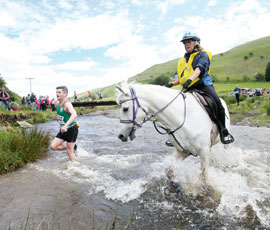
Rolling hills, sheep, a few pubs and a woollen mill: on the surface, Llanwrtyd Wells in Powys looks like any other small rural town in mid-Wales. But every year the former spa town on the edge of the Brecon Beacons transforms itself to become the bustling host of some of the quirkiest sporting events in the world.
From mud-caked bog snorkellers to mountain bike chariot racers, thousands of people flock to Llanwrtyd – described as the smallest town in the UK – to take part in and watch the weird rural pursuits on offer. And this year the sporting events are set to get even stranger as Llanwrtyd is hosting the World
Alternative Games in celebration of the London 2012 Olympics.
Held from 17 August to 2 September, organisers say the Alternative Games will provide something different to the “mundane” events at the Olympics, as well as help promote the town.
Llanwrtyd’s history of hosting unusual sport began in the 1970s with what is now its biggest attraction: the Man versus Horse Marathon. First held 33 years ago, the race started after a drunken conversation between two locals in the bar of the Neuadd Arms Hotel in the centre of the town. Gordon Green, the landlord at the time, overheard them debating whether a man could run faster than a horse over mountainous terrain and challenged them to put it to the test.
The competitors ran 22 miles – just short of a full marathon – starting outside the Neuadd Arms before heading across the farmland, moors and hills. Perhaps unsurprisingly, the horse won, but it launched the start of the annual event, with more and more people travelling to the town each year to take part.
Today the marathon attracts more than 300 solo runners and 100 relay teams each year, while an average of 50 horses and their riders compete, making it the largest horse race in the world, organisers claim. “It started in a small way as a gimmick, but it really has grown amazingly,” says Bob Greenough, one of the event organisers.
“This year we had runners from New Zealand, a guy from New York, two people from Sweden and one from Germany.
“It’s become an international event as more people want to take on the rather unusual challenge. We get regular marathon runners and fell runners; it’s captured people’s imagination and they realise it’s a lovely place to run.”
But while it may have starated as a gimmick, it’s now an important source of income for the town’s hotels, shops, restaurants and the farmers who supply them.
“It gives a big boost to the town; we very much need events like this,” says Mr Greenough. “Without it it would be a very quiet place. It gets people here and thinking about coming back for a few days holiday because it’s such a lovely place.”
The race takes in some of the area’s most picturesque landscapes, taking competitors through farm tracks, footpaths, forest and open moorland. “It’s a tough race and not for the faint-hearted,” Mr Greenough adds. “The first leg has three-quarters of a mile of incessant climbing, starting on tarmac and then through swamp and forest.
“Then the route crosses streams and farmland, so not only will you be wet, you’ll be very muddy.
“We rely on farmers allowing us to use their land and we get a lot of support from the farming community. They do a lot for us in making sure the route is clear and they move their cattle and sheep so we can leave gates open. We can’t do it without the farmers.”
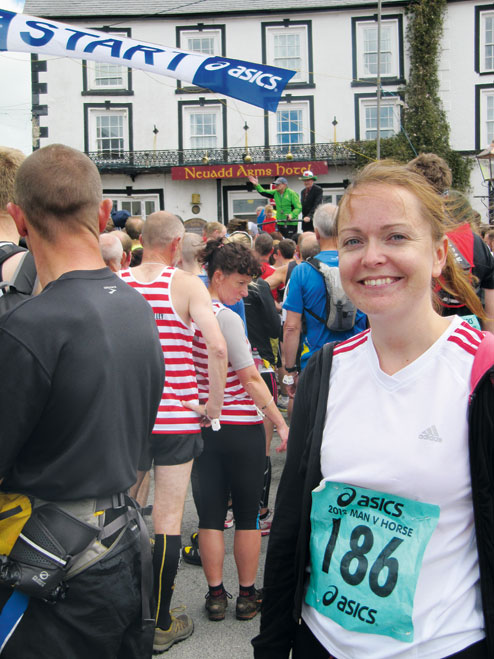
Intrepid participant: Caroline Stocks
By the end I was filthy, exhausted and terrified… but we beat six horses
No good comes from drinking beer with farmers.
Take, for example, the man who – after a pint (or four) in his local pub – ended up betting that he could run faster across 22 miles of Welsh hills than his farmer mate riding a horse.
With sore legs to match his sore head the next day, there’s no prize for guessing who was drowning their sorrows after that race.
More than 30 years later and it turns out people still haven’t learnt the perils of taking on farmers in the pub.
Sitting having a drink with a group of farmer friends, I found myself enthusiastically agreeing that it would be a brilliant idea to recreate the bet and take part in the race. Only this time, I’d be chased by 50 horses, rather than just one.
The fact that the furthest I’d ever run was five miles – and that was on the flattest of land – didn’t dawn on me until the next morning, by which point it was too late: I was signed up.
Over the next few months, fear of being squished by ponies on a hillside meant I trained like mad for running up steep hills and diving out of the way of four-legged runners.
Only when it came to the day of the race, I realised I hadn’t prepared for the biggest perils: mud and water.
Bob, one of the event organisers, told me the route was “a bit swampy” thanks to record-breaking rains in the days before the race.
“The first stream’s probably about calf height at the moment,” he said, clearly trying to make me feel at ease. “But that’s fine, because it’ll take your mind off the horrific down section that comes straight after. And the nasty hill after that.
“The bigger stream’s towards the end. That’s probably about thigh height at the moment, waist-deep if you’re short. How tall are you? You’re only 5ft 3in? Oh. Oh dear! Well, we have been thinking about starting a wet T-shirt competition…” It turned out Bob’s estimations were right – I got very soggy.
But six miles into dragging yourself up steep, craggy hills, wading through thigh-deep, black mud and panicking about where to stand when there’s a horse trying to overtake you on a narrow path, and a swollen river is child’s play.
So how did I get on? Well, it left me filthy, exhausted and at times terrified.
But I didn’t break any bones, I got to see some incredible Welsh countryside, my team finished the whole course in under four hours and we beat six horses. I reckon with a bit more training we can make it seven next year.
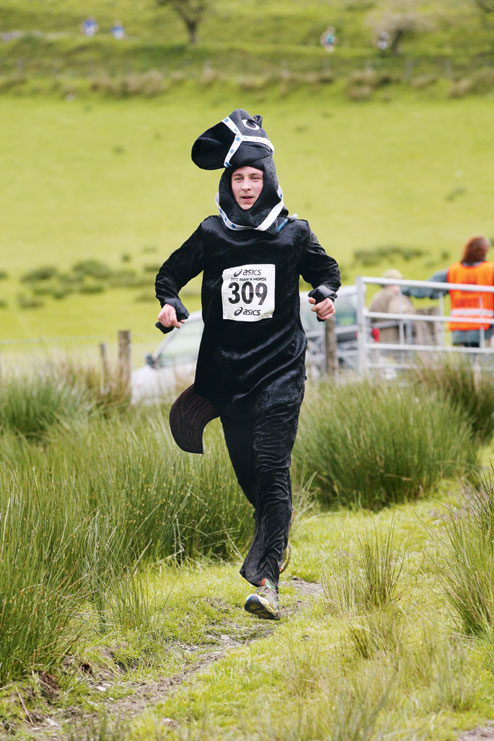
A runner challenges the horse.
Can a man ever run faster than a horse?
It may sound like an unfair race, but men and horses are more evenly matched in the event than you would at first think.
People can cover rough ground at a reasonably consistent pace, while horses have to slow down on hilly ground.
Horses also overheat more easily, so a human is more likely to win on a hot day. Also, horses excel at sprints, while people have a greater endurance for distance running.
Despite these factors, it took 25 years before a man finally beat a horse – even after the course was changed in 1982 to provide a more even match between people and horses.
In 2004 Huw Lobb – a marathon runner for Team GB – won in two hours and five minutes, beating the fastest horse by two minutes.
He is one of only two men to have won the race and pocketed £25,000, which until then had been one of the biggest unclaimed prizes in British athletics.
Mr Lobb was the first runner to cross the finishing line this year in 2hrs 25min 57sec, but the top prize went to a horse, Rheidol Star, ridden by Iola Evans, which finished the course in a mere 2hrs 51min.
Other rural games
As well as the Man v Horse marathon, Llanwrtyd Wells is hosting some other weird rural pursuits this year as part of the 2012 World Alternative Games:
Welsh Open Stone Skimming Championships
Held in June each year, the simple pastime of stone skimming has been turned into a competitive sport. Unlike American stone “skipping”, which counts the number of times a stone bounces, this competition is concerned about how far the stone travels. Artificial, uniform skimming stones have been developed to ensure the games are fair.
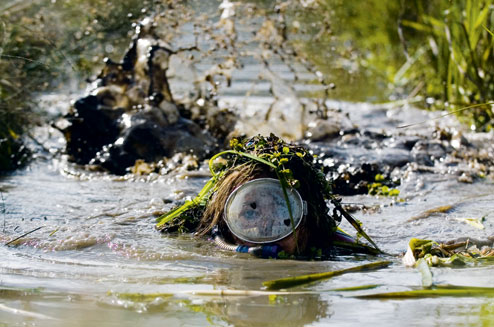
Bog Snorkelling Triathlon
According to organisers, the Bog Triathlon first ran in 2005 “following a demand for more dirty fun around our famous Waen Rhydd Bog”. The event starts with a seven-and-a-half-mile run followed by two lengths of the 60-yard peat bog trench (below) and then a 19-mile mountain cycle.
World Worm Charming Championships
First devised by a teacher in Nantwich, Cheshire, the World Worm Charming Championships have taken place since 1980 and boast a world record of 567 worms collected from a three-metre square in 30 minutes.
Governed by the International Federation of Charming Worms and Allied Pastimes, competitors can only use music and other vibrations to charm them from the earth. The rules, which are available in more than 30 languages, say that worms will be released back to the site “only after the birds have gone to evening roost”.
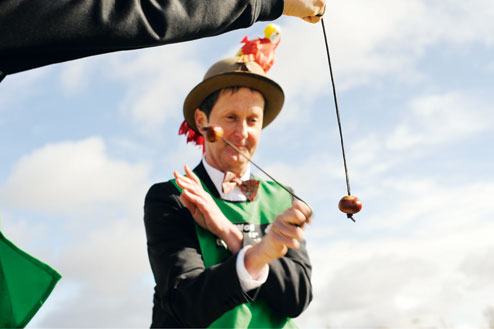
Conker Championships
First held in Northamptonshire in 1965, teams from all over the world now come to demonstrate their skill and ability in the art of conker smashing. Competitors are split into groups of men, women and children and take part in a series of heats to win an all-important gold medal.
World Bathtubbing Championships
Held at a water sports centre not far from Llanwrtyd Wells, the Bathtubbing Championships involve people paddling along a 100m time-trial course in a bathtub. As well as individual races against the stopwatch, there are races between four tubs and “sychronised bathtubbing”, where two people sit facing each other in a tub. With one paddling backwards and one forwards, the pair must negotiate the 100m course in the quickest time. Competitors who sink are disqualified.
Wife Carrying
Legend says wife carrying began as a sport in Finland after a bandit named Rosvo Ronkainen led groups of men to steal women from neighbouring villages. To prepare for the raids, Rosvo would make his men prove how fast they could run while carrying a woman. The fastest carriers were allowed to participate in the raids. Today the competition involves “wives” being carried along a 255m course as fast as possible. Couples don’t need to be married and there are no minimum weights for the wife. In fact, the rules encourage “little people and dwarf carrying”. The winners receive the wife’s weight in beer.
